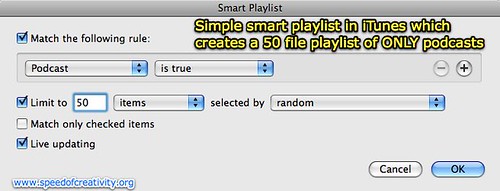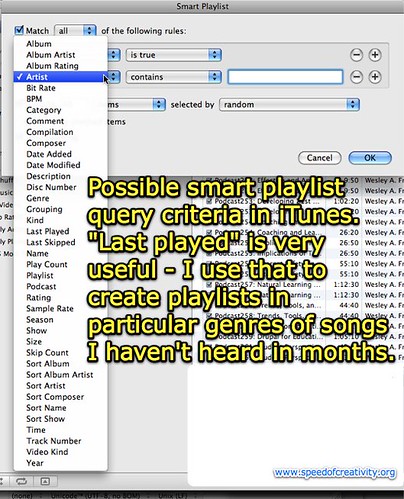One of the delightful potentials we have today if we’re fortunate to be digitally connected to the Internet and own (or have access) to a mobile audio player (like an iPod) is to be influenced regularly by amazing people and their thought-provoking ideas. Several months ago I became aware of the power of “smart playlists” in iTunes to provide a random sampling of songs and podcasts on my iPhone, and that setup decision led to this morning’s learning events listening to Steven LeVine’s presentation from November 2007 at the University of Chicago about themes and issues raised in his book “The Oil and Glory: The Pursuit of Empire and Fortune on the Caspian Sea” during my commute to work. I’ll briefly address the technical aspects of my iPod/iPhone setup which led to this learning opportunity, and then reflect about about the content of Steven’s discussion as well as implications it suggests for students in our classrooms.
Before we get to technical issues, let’s not lose sight of how amazing and powerful the very opportunity to have this learning moment is. Because most of the people reading this post in 2008 received the majority of their formal educational experiences in 20th century face-to-face settings, I think a majority of people today undervalue of the learning potential latent in asynchronously accessed media files. Steven shared this presentation almost a year ago. I have no connection to him or the University of Chicago. I live in Oklahoma. However, because individuals at the University of Chicago’s Center for International Studies have chosen to share a variety of presentations on their “World Beyond the Headlines” podcast channel, and I subscribed to their podcast many months ago via PodNova and on my podcatcher and podcatching software (iPhone and iTunes) this learning opportunity was possible. For more info specifically related to PodNova, see my May 2007 post “The joy of Juice Receiver and PodNova.” (Also note I have abandoned Juice Receiver (at least for now) and am using my imported PodNova OPML in iTunes.)
I can’t say this learning opportunity was accidental, because I’ve taken steps in the past to intentionally position myself (or at least put digital audio resources at my fingertips) which enable learning moments like today’s to happen. The two key, intentional steps I took in the past which allowed today’s learning to happen were:
- Subscribing to the “World Beyond the Headlines” podcast channel
- Creating a random playlist in my iTunes for podcasts and syncing that playlist to my iPod.
My larger, 80 GB iPod was recently stolen out of my car, so I cannot currently take my entire iTunes collection of songs, podcasts and videos with me. I have just under 4000 music and audio files in my iTunes library currently, and these won’t all fit on my 8 GB iPhone. To be pleasantly surprised with new songs and podcasts that I haven’t heard before (or in the case of songs, in a long time) smart playlists are critical.
To create a smart playlist in iTunes, from the file menu choose “New Smart Playlist.”
iTunes will next present you with a dialog window in which you can specify multiple criteria for your smart playlist. A smart playlist is dynamic and can have complex criteria. In the following example, I first set the criteron: “Podcast is true.” This makes the smart playlist automatically “populate” with all the files on my iPhone (audio and video) which have been downloaded as podcasts. This is different than setting the “genre” to “podcast,” I think. Not all podcasts have their genre set to podcast, so that criteria might be less inclusive than the method I’ve highlighted here. I have too many audio and video podcasts to fit them all on my iPhone, however, so I checked the box to limit the playlist 50 random items meeting the specified criteria and only allow those files in the playlist.
Many, many other options are available to set for smart playlist query criteria.
That hopefully explains HOW a 40 minute audio recording of a lecture by Steven LeVine was available on my iPhone this morning. Next I’d like to address some of the ideas and topics he discussed.
I’ve had a fascination with Central Asia for many years. One of the first blog posts I ever wrote was in July 2003, titled “Photos from Baghdad, email from Central Asia.” My May 2004 post “Armenia and the Allure of Ararat” explains a bit of my historical interest in the region, which dates back to the late 1970s when our family become friends with several Iranian families in the United States for undergraduate pilot training in Columbus, Mississippi. My love of mountains also ties in here, along with my 1983 trip to Turkey with my grandmother and mother, as might my reading of James Michener’s book “Caravans” in college. I studied Central Asia for a semester as a geography major at the US Air Force Academy, and wrote a paper about the potential for religious revolution in light of the region’s minority Shia and majority Sunni Muslims. (My predictions in that paper turned out to be quite wrong, and I never published or shared it beyond my instructor’s desk. Perhaps that’s good!) To this day I remain fascinated by Central Asia, its people, history, geography and culture, and hope some day to travel there. Given that background, perhaps you can better understand my interest in Steven’s lecture today.
I have read about Baku previously and the oil fields in and around the Caspian Sea, but I had no idea oil had been (and still is) SO plentiful there. I read a biography of Alfred Nobel in high school and knew a little about how he invented dynamite and was the father of the Nobel Prizes, but had never heard of his brother Ludvig Nobel. According to the current WikiPedia article for Ludvig:
With his brother Robert, he operated Branobel, an oil company in Baku, which at one point produced 50% of the world’s oil. He is credited with creating the Russian oil industry.
Wow. Steven discussed some of the past history of Baku, including some of Ludvig’s achievements. At one point in world history he was personally responsible for the production of 9% of global oil production. What would that 9% amount to today, in both barrels of oil and oil value? There’s a good word problem for your students. Why did Steven say that Ludvig was at most responsible for 9% of global oil production, but the WikiPedia article (currently) says 50% of the world’s oil? There’s a discrepancy here. An opportunity for media literacy skill development: information validation, research and analysis.
Here’s a challenge: Ask a group of your students to research this discrepancy and post the answer here on this blog entry.
I found Steven’s tales of the “blue light” over Baku in the early days of the oil industry there intriguing. The oil was so close to the surface, local residents would dig a small hole by hand and then LIGHT the oil or natural gas which escaped directly, using it to cook food for their meals. No Coleman stoves required in that era of human history around Baku, apparently. I’ve never heard a story like that before.
I also was intrigued to learn about the Baku-Tbilisi-Ceyhan pipeline, which is the lifeline of the western Caucasus region now.
Students in parts of the United States may be more familiar with the Trans-Alaska Pipeline System, since it is in North America. In both cases, these pipelines play important roles in the energy and economic dynamics of the countries and regions they cross.
I was fascinated to hear Steven recount the mid-20th century history of Baku and its oilfields. Joseph Stalin had concrete placed over the wells in the Baku oil fields to prevent Hitler from taking them in World War II. If Hitler had seized control of Baku, the balance of power in that global conflict could have shifted dramatically. As a result of Stalin’s decision to concrete over the Baku wells, the entire area was closed to international oil development until the Berlin Wall fell in 1989.
I had no idea that “we,” as the United States, are the inheritors of the debt of the Soviet Union. That was one of a multitude of facts Steven shared in his lecture which amazed me. Wow. I wonder what that total bill was and is? As if the United States doesn’t have enough foreign debt already. Too much.
I’d never heard about Sheila Hesslen (spelling?) who worked for the US Department of State, served on the National Security Council for President Clinton, and coined the term “iron umbilical cord” for the the Baku-Tbilisi-Ceyhan pipeline. She encouraged the United States to join a “battle for influence” in the Caucasus region, which continues to this day.
According to Steven LeVine in this lecture, the Baku-Tbilisi-Ceyhan pipeline is the key to understanding modern Russia, Vladamir Putin, and much of the geopolitics of the trans-Caucasus region. Russia was pushing (in late 2007) for a new pipeline that it wanted/wants Chevron and Exxon to pay for, which would link Bulgaria to Greece. There is a HUGE potential for ecological disasater in the
the Bosphorus as tankers (which were invented by Ludvig Nobel, incidentally) move oil across the Black Sea, through the Bosphorus and into the Mediterranean.
Why do I find this lecture and these ideas so interesting and engaging? I think a big reason is because of PRIOR CONNECTIONS and schema I have for these issues and topics. How can we help our students connect with and find meaning in topics like these: competition for oil resources in the early 20th century, the geopolitics of Central Asia and the larger world, the myriad of implications involved in the international oil industry, and others? I think one answer is THROUGH STORIES and through personal connections to people outside the classroom involved in these situations.
Wouldn’t it be interesting and worthwhile to involve your students in a videoconference with a an executive of BP who is knowledgeable about the current situation involving BP officials leaving Russia and going into hiding? Couldn’t you see your students getting interested in these issues if an exchange student from a central asian country like Kazakhstan came to visit with your class in-person, and explained the impact of NOT having an oil pipeline like Baku-Tbilisi-Ceyhan for countries east of the Caspian Sea?
Current events, history, economics, politics, mathematics, science and engineering are most interesting and impactful when we have PERSONAL CONNECTIONS to them and to people involved with them. This should be a key goal of our formal curriculum in schools: Helping students make personal connections with others located in different parts of the world, and who have traveled to or lived in different parts of the world. I am passionate about the global education agenda, which can be interpreted in various ways I suppose. In this context, I’m passionate about helping learners experience meaningful educational experiences related to global education issues because of and through personal connections.
If you are looking for specific ways and portals to get connected with other teachers and students in distant lands, join and participate in Lucy Gray’s Global Education Ning, join ePals and search for global projects as well as classroom partners, and plan to participate in the K-12 Online Conference this coming October. All of these websites offer superb opportunities to connect, collaborate, and inspire students around issues related to global education aims.
Technorati Tags:
oil, caspian, baku, turkey, politics, central, asia, russia, bp, chevron, videoconferencing, learning, education, connections
If you enjoyed this post and found it useful, subscribe to Wes’ free newsletter. Check out Wes’ video tutorial library, “Playing with Media.” Information about more ways to learn with Dr. Wesley Fryer are available on wesfryer.com/after.
On this day..
- iPhoneography Light Painting – 2013
- Stories we wish we had recorded or could record – 2010
- Create a free online survey with Google Forms – 2010
- Notes from the RTNDF Multimedia Workshop (Oklahoma) – 2009
- How can I join tonight’s skypecast? – 2008
- Report from EduComm 2007 – 2007
- Sightspeed VOIP – 2006
- RSS to Email with Feedblitz – 2006
- Fun with Photo Booth – 2006
- Respond to DOPA with Moodle at your church – 2006






Comments
2 responses to “Central Asia, Oil, Geo-Politics and Smart Playlists”
Hello! I have been an avid reader of your blog for some time. I have been working in the field of educational technology for the past eight years.
As I read this post, I noticed your mention of Columbus Air Force Base! I live 23 miles from there in Starkville, MS. And my husband’s grandfather had one of the streets on the base named after him last month (Ralph Webb).
It’s good to note the connection with one of my virtual mentors! Keep up the great posts.
Melanie
melaniej on Diigo
Hi Melanie! I’m always interested how personal references like this one to Columbus can pave pathways of connections with others.
I have lots of memories of Columbus! Our house on base backed up to a swamp, and I remember sometimes we’d have cotton mouth snakes shed their skins in our flowerbeds. Never saw one though. I remember fire ants! And I definitely remember eating cucumbers with our Iranian friends at the alert facility on base and playing ping pong, when all the families had to move on base to the alert facility after the revolution in Iran in 1979 during the hostage crisis.
Our two years in Columbus were the only two years of my education that I attended private schools. I attended St Mary’s Catholic school for the first half of fourth grade, and Warden Carden school for the last half of fourth grade and all of fifth grade. That was an amazing experience. Both were memorable for different reasons. Several stories are coming to mind….. 🙂